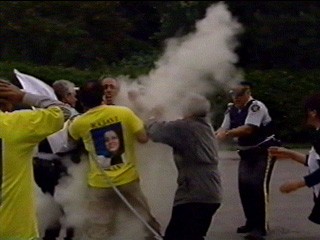An interview with Batool Soltani on MKO self-immolations – Part seventeen
Sahar Family Foundation: Ms. Soltani, the June 17 operations, however, has recorded  achievements for the organization. They can be summed up from two aspects. One is the negative outside consequences and another is the internal achievements the organization thought it had achieved. It is the latter aspect that I mean you explain exclusively from Rajavi’s point of view.
achievements for the organization. They can be summed up from two aspects. One is the negative outside consequences and another is the internal achievements the organization thought it had achieved. It is the latter aspect that I mean you explain exclusively from Rajavi’s point of view.
Batool Soltani: The achievements were specifically summed up by Rajavi in one of his messages addressed to the members of the Leadership Council. One significant point to mention here is that Rajavi critically evaluated self-immolations as ‘dilly-dally’ meaning that the members had dwindled in June 17 self-burnings which had diminished the expected resultant outcomes. Then he began to enumerate the achievements of the very same ‘dilly-dally’. The first resultant he stated to be the French police’s pullback. But I think he meant recession of the whole judiciary of France.
I have already made clear that Rajavi’s insistence on Maryam’s release was mainly because of the probable challenging consequences of the case. If the case pursued a routine, legal course, the outcome could be absolutely different. But he was clever enough not to mention the odds and probabilities and briefly alluded to police’s back off. In spite of the fact that efforts were directed at releasing Maryam, Rajavi referred to it as the second achievement. Here he paused to say that further goals had been achieved had the volunteers been much sincere in carrying out their operations.
SFF: Sorry for interruption. What did he mean by sincere?
BS: To tell the truth, I fail to make out an exact connotation for the term. Maybe he wanted to say self-immolations were deficient in number of volunteers and operations. But he would always say that by self-burnings he intended those episodes that would not be necessarily marginalized as pyrrhic victories and carried with them the needed push and effect. Rajavi would say that they knew that even multitudes of self-burnings inside Camp Ashraf fell short of imposing needed effectiveness to score a victory; all depended on a decision in due time and place. It was Mozhgan (Parsai) to make decisions in Ashraf as it was Maryam in Auvers and all senior rankings stationed in the organization’s offices throughout the world. In fact, he was stressing on the efficiency of actions if any responsible ranking would adopt in the sphere of his responsibility.
In general, he was not satisfied with the immediate outcomes and believed that if the organization had less dawdled, the existing potentials and effectiveness would have caused the immediate release of Maryam.
SFF: Sorry again Ms. Soltani. If self-burnings were committed all on organizational command, then, what Rajavi really meant by the members’ dwindling that had caused deceleration of outcome?
BS: It seems that you did not consider my points. The organization has adopted a double behavior policy vis-à-vis the outsiders and insiders …
SFF: I got the point but I mean if 25 have committed self-immolation on organizational command, then, the cease of the 26th means the compliance with the same very order. If it is true, then what does this ‘dilly-dally’ mean? Does it mean that you have been remiss in your responsibility or anything else?
BS: He mainly implied that a member of the Leadership Council that was fully briefed on the strategy of self-immolation had to rush to the first police station to set himself on fire immediately after hearing the news of Maryam’s arrest. Instead, he/she had abandoned what had to do and had put it off for the next day. Self-burnings had to be executed immediately while they had been postponed for a later time after arrangements. Maryam should not have stayed so long in the prison. Rajavi was very sensitive about the due time and place and believed that any delay contributed to loss of a remarkable percentage of effectiveness and all efforts proved to have been in vain.
You see, although self-burnings were organizationally arranged and ordered, there existed still factors so Rajavi could be critical of the members and berate them for negligence in the accomplishment of their duties. In reference to your bringing up the number of self-burnings and that the 26th was ceased by organizational command, I have to say that it is not as you think. It is not at all an issue of the numbers and quantity; they are only instruments to reach the desired outcome. Maybe that is why Rajavi criticizes members’ hesitation to start off self-burnings. You see, the initiation of operations share similar origin but the pace of process and other factors influence the acceleration and deceleration in achieving the final objectives.
To be continued
